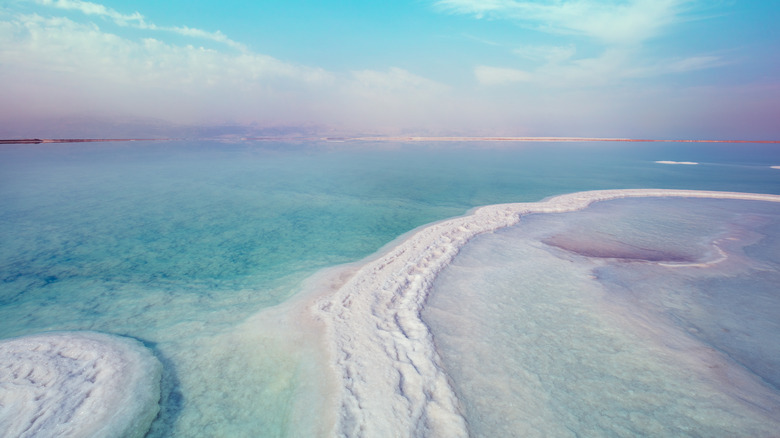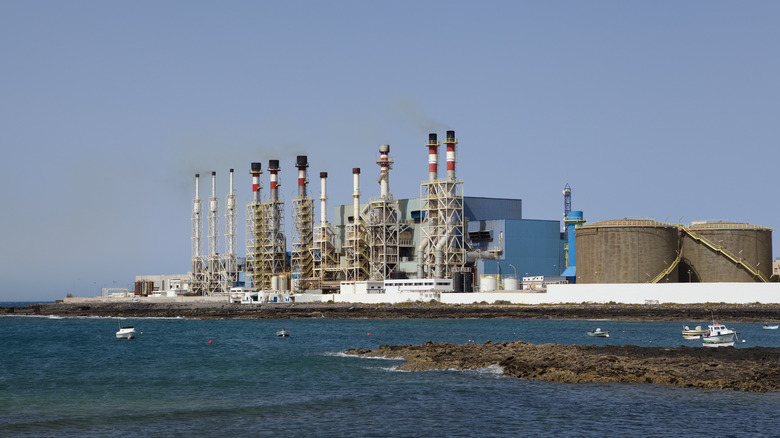Why Can't Humans Drink Salt Water?
When you look at a globe and see the expanse of blue, it's hard to imagine that drinking water is a valuable commodity. After all, the U.S. government's Water Science School says that roughly 71% of our planet is covered in this life-sustaining liquid. Surely, that's enough to keep the world's landlubbers hydrated. Wrong. The vast majority of it — nearly 96.5% — is salt water and, therefore, undrinkable.
Most people take this liquid for granted. You likely drink water every day. At least, you should. According to the U.S. Department of Agriculture, the average American aged two and up drinks 3.9 cups of this unblemished beverage per day. While that may not seem like a great deal, it's important to note that everything we drink has water in it, making actual water consumption significantly higher. And then there's the water used for bathing, doing dishes, watering gardens, and brushing teeth. It all adds up. In fact, the U.S. Environmental Protection Agency says that a typical family goes through over 300 gallons of this liquid gold on a daily basis. That's a heck of a lot of water.
With such a small amount of fresh, salt-free water available, the oceans and their plentiful wet stuff look more and more appealing. Surely, humanity could turn to these for sustenance if the lakes and rivers dry up, right? Well, if you are referring to humans drinking salt water in its natural state, the answer is a resounding no. And here's why.
Drinking salt water leads to dehydration
Perhaps, it is important to begin by illustrating just how much salt the oceans contain. It's not merely like when you eat too much salt in the form of a full bag of potato chips. It's dramatically worse. The U.S. Department of the Interior notes that if all the sea salt were to be taken out of the water and spread out over the land, it would create an over 500 feet thick layer. This water is called saltwater for a very good reason.
Now that you know just how much salt is involved, you should better understand why drinking salt water is harmful to your health. Consuming this much salt will leave you more dehydrated than you were, to begin with. Wonderopolis explains that seawater contains about four times as much salt as human blood.
When you consume too much salt, the kidneys work to dispose of it, and this requires water — salt-free water. As a result, the kidneys will actually require more water than you've ingested. The amount of salt water you drink could cause your organs to give out, which could be fatal. Yes, it may sound counter-intuitive, but you would be better off drinking nothing at all than opting for salt water.
New technologies seek to improve the desalination process
Some parts of the world, however, are experiencing serious water shortages, making the oceans look more appealing. For example, The Washington Post observed that the dwindling Colorado River, low water reserves at Lake Mead and Lake Powell, and ongoing California droughts are signaling a water crisis that may require desalination, the process through which salt is removed from seawater in order to create a potable liquid.
The biggest problem is that this process produces salty waste, can harm marine life and is extremely expensive. Nevertheless, advancements are being made that will — hopefully — one day solve these water issues. For example, Oneka Technologies, a Quebec-based company, has created a new type of pumping system that is powered by waves. This machine discharges the concentrated salt water into the ocean and moves drinking water to the coastline via an underwater conduit (via The Weather Network).
But desalination still remains unattainable for most. In 2019, The New York Times reported that a mere 1% of all freshwater was achieved through desalination. Clearly, more work needs to be done. In the meantime, the ocean is a great place to swim and surf, but it won't quench your thirst.


